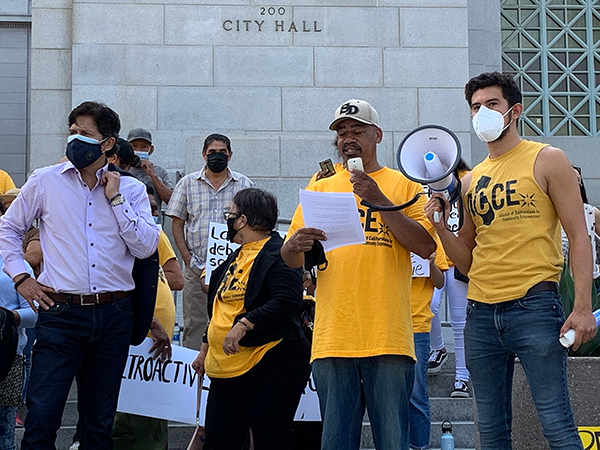Wave Wire Services
LOS ANGELES — An ordinance aimed at preventing landlords from harassing tenants went into effect Aug. 6 after being adopted by the Los Angeles City Council on a 13-0 vote.
The ordinance, approved June 23 when two council members were absent and signed into law by Mayor Eric Garcetti, prevents landlords from harassing tenants by eliminating services, withholding repairs, refusing to accept rent payments or taking other retaliatory actions.
Tenant leaders organized by the Alliance of Californians for Community Empowerment gathered outside City Hall to celebrate the ordinance going into effect. The alliance had been organizing to put pressure on council members to pass the ordinance, which had been stalled in committee.
“The anti-harassment ordinance had been in limbo for over four years in the housing committee,” an ACCE representative said. “During the pandemic, the Stay Housed Coalition and ACCE saw an uptick in cases of landlord harassment, so ACCE along with other organizers decided to come together to fight for a just tenant anti-harassment ordinance.”
The ordinance had been in the works since Feb. 2, 2017, when then- Councilman Jose Huizar introduced a motion to have the Housing + Community Investment Department review other cities’ anti-harassment ordinances and report on the possibility of adopting a similar measure in Los Angeles.
After a long process, the ordinance’s draft was reviewed by the City Council on June 9, when council members voted to strengthen various aspects, including through an expanded definition of harassment, and directed the City Attorney’s Office to incorporate the revisions and bring the measure back for final approval.
The ordinance defines tenant harassment in several ways, including reducing or eliminating housing services, such as parking; failing to perform necessary repairs and maintenance; abusing the right to access a rental unit; threatening a tenant with physical harm; misrepresenting to a tenant that he or she is required to vacate the unit; refusing to accept rent payments; and inquiring about a tenant’s immigration status.
Through amendments from Councilwoman Nithya Raman, the ordinance also includes tactics like coercing a tenant to vacate with offers of payment; failing to perform necessary repairs on time as required by federal, state, county or local housing, health or safety laws; failing to minimize exposure to noise, dust, lead, paint, asbestos and other harmful building materials; and interfering with the comfort, peace or quiet of a tenant.
While the definition was expanded to include a wider range of harassment tactics, council members also set the bar higher for what classifies as tenant harassment, as proposed by Councilman John Lee.
The definition includes “a landlord’s knowing and willful course of conduct directed at a specific tenant or tenants that causes detriment or harm and that serves no lawful purpose.”
The alliance thanked Council President Nury Martinez for bringing the ordinance to a vote and Raman for being a “fearless champion throughout the campaign.”
Raman had attempted to amend the ordinance to lower the bar for what would qualify as tenant harassment, but the amendment — which defined harassment as a landlord engaging in “knowing and willful commission of” the defined acts of harassment — wasn’t incorporated.
Raman expressed concern about the approved amendment, saying that some landlords lawfully remove amenities, such as parking spaces, from tenants as a harassment tactic.
David Michaelson of the City Attorney’s Office told Raman it would be up to a court to decide if the intent was lawful, even if the tactics were.
Under the ordinance, if harassment occurs, a tenant who prevails in court may be awarded compensation for damages, rent refunds for reduction in housing services and reasonable compensation for attorney’s fees.
A landlord might also be fined up to $5,000 if the tenant is older than 65 or disabled. For repair or maintenance issues, a tenant is required to provide written notice to the landlord of the alleged violation before initiating a civil proceeding or small claims case.
According to that amendment, it will be a misdemeanor “to attempt to interfere with the peaceful enjoyment, use, possession or occupancy of any premises by the lawful lessee or tenant of such premises either by threat, fraud, intimidation, coercion, duress or by the maintenance or toleration of a public nuisance, or by cutting off heat, light, water, fuel or free communication by anyone by mail, telephone or otherwise, or by restricting trade or tradesmen from or to any such tenant.”
Council members amended the ordinance to force rental units protected by the Rent Stabilization Ordinance to be rented at the lawful rent in effect at the time of the most recent termination of tenancy if the landlord is found to have vacated the unit through harassment.
Raman told council members before the vote that amendment is among those she is most proud of, as it “eliminates the incentive for landlords to engage in this kind of behavior in the first place.”
“I really want to be clear today, as we’re talking about this issue, who this ordinance will help,” Raman said. “The more vulnerable the tenant is, the more likely they are to be affected by harassment and to be displaced by harassment.”
She added that people of color, low-income renters, women and families with children are disproportionately affected by tenant harassment.
The alliance reiterated its request for the council to amend the ordinance to ensure enforcement, including forcing landlords to pay a tenant’s legal fees.
ACCE unsuccessfully argued that the part of the measure that says a tenant who prevails in court “may” be awarded attorney’s fees “is a crucial loophole which can be the difference between gaining access to lawyers for these tenants of harassment.”
“We have to close this loophole, the law has to be clear,” an ACCE representative said in June.
“As the ordinance stands now, the burden of proof is on the tenant to prove harassment. We want to change this language so that the burden of proof is on the landlord to prove that they are not harassing the tenants.”











